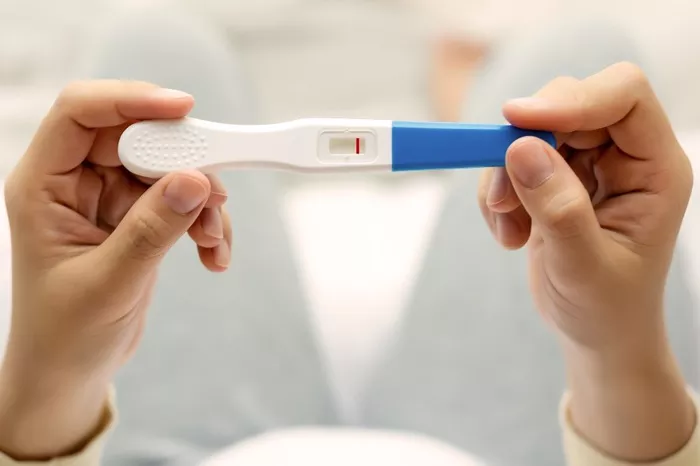Implantation bleeding occurs when a fertilized egg attaches to the lining of the uterus. This process usually happens about 6 to 12 days after conception. The bleeding is typically light and may last from a few hours to a couple of days. It is often mistaken for a light period.
What Does Implantation Bleeding Look Like?
Implantation bleeding is usually lighter in color and flow compared to a regular period. The blood might be pink, light red, or brown. It doesn’t contain clots and is generally less heavy than menstrual bleeding.
Signs of Implantation Bleeding
Implantation bleeding is one of the earliest signs of pregnancy. Besides light bleeding, other symptoms may include:
Mild cramping
Breast tenderness
Nausea
Fatigue
When to Take a Pregnancy Test
After noticing implantation bleeding, you might be eager to take a pregnancy test. But timing is crucial for accurate results.
How Pregnancy Tests Work
Pregnancy tests detect the hormone human chorionic gonadotropin (hCG) in your urine. hCG is produced by the placenta shortly after the embryo attaches to the uterine lining.
hCG Levels After Implantation
hCG levels start to rise rapidly after implantation. However, it takes a few days for the levels to be high enough to detect with a home pregnancy test.
Waiting for Accurate Results
For the most accurate results, it’s recommended to wait until the first day of your missed period to take a pregnancy test. This is usually about 14 days after conception.
SEE ALSO: How Early Pregnancy Test Can Detect HCG?
Taking a Pregnancy Test Too Early
Taking a pregnancy test immediately after implantation bleeding can result in a false negative. This is because hCG levels might not be high enough to be detected yet.
Early Pregnancy Tests
Some home pregnancy tests are marketed as being able to detect pregnancy up to six days before your missed period. These tests are more sensitive and can detect lower levels of hCG.
Best Time of Day to Take a Pregnancy Test
For the most accurate result, take the pregnancy test first thing in the morning. Your urine is more concentrated, and hCG levels will be higher.
What If the Test Is Negative?
If you take a test right after implantation bleeding and it’s negative, don’t lose hope. Wait a few days and test again. hCG levels double every 48 to 72 hours in early pregnancy.
Factors Affecting Pregnancy Test Accuracy
Several factors can affect the accuracy of a home pregnancy test:
Testing too early
Diluted urine
Expired test
Incorrect test usage
Confirming Pregnancy
If you have a positive result, it’s essential to confirm the pregnancy with a healthcare provider. They can perform a blood test and an ultrasound to verify the pregnancy.
False Positives and Negatives
False positives and negatives are rare but can occur. A false positive might happen if you have certain medical conditions or are taking specific medications. A false negative can occur if you test too early or don’t follow the test instructions correctly.
Consulting a Healthcare Provider
If you have symptoms of pregnancy and a negative test, or if you have a positive test, schedule an appointment with your healthcare provider. They can provide more accurate testing and advice.
Emotional Considerations
The process of waiting and testing can be emotionally challenging. It’s important to have support and take care of your mental health during this time.
Conclusion
Implantation bleeding is an early sign of pregnancy, but taking a pregnancy test right after this bleeding might not provide accurate results. For the most reliable results, wait until the first day of your missed period to take a test. If you receive a negative result but still suspect pregnancy, test again in a few days. Always consult a healthcare provider to confirm your pregnancy and discuss any concerns.
Understanding the timing and process of implantation bleeding and pregnancy testing can help manage expectations and reduce stress. With the right information and support, you can navigate this early stage of pregnancy with confidence.
FAQs
How long after implantation bleeding can you take a pregnancy test?
You should wait at least 2-3 days after implantation bleeding to take a pregnancy test for accurate results. Testing too early can result in a false negative because hCG levels may not be high enough to detect yet.
How long after implantation does hCG rise in urine?
After implantation, hCG levels typically start to rise rapidly. It usually takes about 2-3 days after implantation for hCG to be detectable in urine with a home pregnancy test. However, the exact timing can vary from woman to woman.
What happens after implantation bleeding stops?
After implantation bleeding stops, some women may experience mild pregnancy symptoms such as breast tenderness, fatigue, or nausea. Others may not notice any additional symptoms until closer to the time of their missed period. The body continues to produce hCG, and pregnancy hormones begin to increase.
How many days after implantation bleeding occurs?
Implantation bleeding typically occurs about 6-12 days after conception, though it can vary. If you experience implantation bleeding, it’s a sign that the embryo has successfully implanted into the uterine lining.


